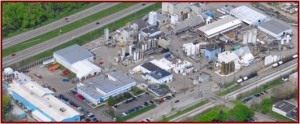Dover Chemical Corporation has agreed to pay $1.4 million in civil penalties for the unauthorized manufacture of chlorinated paraffin chemicals at facilities in Dover, Ohio, and Hammond, Indiana. The settlement resolves violations of pre-manufacture notice obligations under the Toxic Substances Control Act (TSCA) for Dover Chemical’s production of various chlorinated paraffins used in oil additives and coolants, which are in widespread use in the automobiles, automaking and other industries.
Dover Chemical produces the vast majority of the chlorinated paraffin products sold in the United States, according to the Department of Justice and the U.S. Environmental Protection Agency (EPA), which made the joint announcement today.
A pre-manufacture notice or PMN includes information concerning the specific chemical identity, use, anticipated production volume, exposure and release information and existing available test data.
As part of the settlement, Dover Chemical has ceased manufacturing short-chain chlorinated paraffins, which have persistent, bio-accumulative and toxic (dubbed PBT) characteristics. PBTs pose a number of health risks, particularly for children, including effects on the nervous system and cancer, according to EPA. Dover Chemical will also submit pre-manufacture notices to EPA for various medium-chain and long-chain chlorinated paraffin products.
“This settlement will require Dover to participate in an EPA review of all types of chlorinated paraffin products sold by the company and bring Dover into compliance with the Toxic Substances Control Act,” said Ignacia S. Moreno, Assistant Attorney General for the Environment and Natural Resources Division of the Department of Justice.
Chlorinated paraffins are a family of chemical substances with different properties depending on their carbon chain lengths, generally identified as short, medium or long-chain, according to EPA. Chlorinated paraffins are used as a component of lubricants and coolants in metal cutting and metal forming operations, as a secondary plasticizer and flame retardant in plastics, and as an additive in paints.
Short-chain chlorinated paraffins have been found to be bio-accumulative in wildlife and humans, as well as toxic to aquatic animals at low concentrations. EPA has developed a plan for these chemicals based on the potential for significant impacts on the environment.
EPA is also studying the environmental and health concerns relating to medium-chain chlorinated paraffins and long-chain chlorinated paraffins, which may be similar to those associated with short-chain chlorinated paraffins.
In 1978, EPA compiled the initial TSCA Inventory of chemical substances from industry submissions and those substances were grandfathered onto the TSCA Inventory without additional human health or environmental review.
Chemical substances not on the TSCA Inventory constitute “new chemical substances” for which a pre-manufacture notice (PMN) must be submitted to EPA at least 90 days before a company begins producing the substance.
EPA identifies risks associated with new chemicals through the PMN process. In the PMN process, EPA can require additional testing or issue orders prohibiting or limiting the production or commercial use of such substances.
The proposed settlement agreement, recorded in the U.S. District Court for the Northern District of Ohio, is subject to a 30-day public comment period and approval by the federal court. More information on the settlement: http://www.epa.gov/compliance/resources/cases/civil/tsca/doverchemical.html


